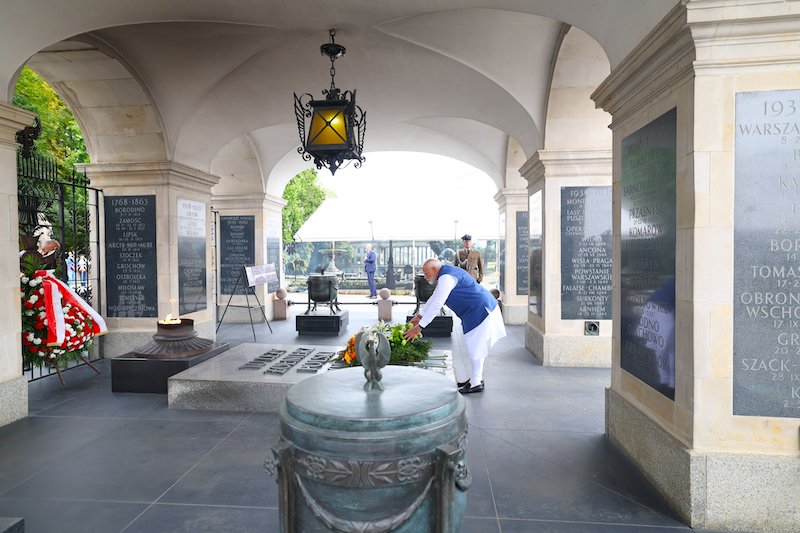 Prime Minister Narendra Modi laying a wreath at the Tomb of the Unknown Soldier in Warsaw. (Photo: X/@narendramodi)
Prime Minister Narendra Modi laying a wreath at the Tomb of the Unknown Soldier in Warsaw. (Photo: X/@narendramodi)
New Delhi: During his two-day visit to Poland, the prime minister, Narendra Modi, delivered several key messages that underscored India’s commitment to peace, diplomacy, and international cooperation. During an address to the Indian diaspora in the Polish capital, Warsaw, on Thursday, Modi said, “India believes in Buddha, in peace … This isn’t a time to engage in war. This is the time to come together against those challenges which threaten humanity.”
This comes just a day ahead of Modi’s scheduled visit to Ukraine, which will be the first by an Indian prime minister since Ukraine became an independent country after the collapse of the Soviet Union in 1991.
Earlier, Modi’s recent visit to Poland marked a significant milestone in India-Poland relations, as it is the first visit by an Indian prime minister to the country in 45 years. Modi’s arrival in Poland also coincided with the 70th anniversary of diplomatic relations between the two nations.
In a ceremonial welcome in Warsaw, on Wednesday, Modi was greeted by Tusk and accorded a guard of honour. Later, the Indian prime minister also laid a wreath at the Tomb of the Unknown Soldier in Warsaw.
I am glad to have met my friend, Prime Minister @donaldtusk. In our talks, we took stock of the full range of India-Poland relations. We are particularly keen to deepen linkages in areas such as food processing, urban infrastructure, renewable energy and AI. pic.twitter.com/a7VqCfj9Qa
— Narendra Modi (@narendramodi) August 22, 2024
During his stay in the Polish capital, Modi engaged in high-level discussions with Poland’s top leaders, including the country’s president, Andrzej Duda, and the Polish prime minister, Donald Tusk. The discussions centred around strengthening economic ties, with a particular emphasis on trade, cybersecurity, and defence cooperation.
During the talks, Modi also highlighted India’s commitment to becoming a major green hydrogen hub and discussed potential collaborations in the renewable energy sector.
Later, in a bid to strengthen cultural and educational ties, Modi announced the launch of the Jam Saheb Memorial Youth Exchange Programme. This initiative will allow 20 Polish youths to visit India annually, fostering greater understanding and collaboration between the two nations.
Modi also addressed a joint news meeting along with Tusk.
Addressing the press meet with PM @donaldtusk of Poland. https://t.co/Jqqn27ZeJq
— Narendra Modi (@narendramodi) August 22, 2024
As mentioned earlier, the Indian Prime Minister also addressed the Indian diaspora in Poland during his stay in Warsaw, urging them to act as ambassadors for India and inspire Polish families to visit India. He emphasized India’s progress in various fields, including healthcare, education, and space exploration, and reiterated India’s commitment to peace and diplomacy.
In his address, Modi also highlighted India’s proactive role in global humanitarian efforts. The prime minister mentioned India’s swift response during crises, such as the Covid-19 pandemic, where India supplied medicines and vaccines to over 150 countries. He emphasized, “Empathy is also an identity of us Indians. If any country in the world faces a crisis, India is the first country to extend a helping hand.”
Thank you Warsaw! Today’s community programme was extremely lively and memorable.
— Narendra Modi (@narendramodi) August 21, 2024
Here are some glimpses. pic.twitter.com/b4KzxE2Zld
The prime minister is now set to travel to Ukraine on Friday at the invitation of the country’s president, Volodymyr Zelenskyy. This visit is particularly seen as significant given the ongoing Russia-Ukraine conflict, where India has maintained a neutral stance, advocating for dialogue and peaceful resolution.
As India Sentinels had reported, Zelenskyy had sharply criticized Modi’s visit to Russia in July, while calling the Russian president, Vladimir Putin, as “world’s most bloody criminal.”
Nonetheless, Modi’s Ukraine visit aims to reinforce India’s support for a peaceful resolution of the conflict while also exploring avenues for humanitarian aid and reconstruction efforts. In Kyiv, Modi is expected to hold talks with Zelenskyy and other top Ukrainian officials, focusing on security, economic cooperation, and India’s role in post-war reconstruction.
Modi’s back-to-back visits to Poland and Ukraine highlight India’s strategic interests in Central and Eastern Europe while positioning itself as a global advocate for peace. By strengthening ties with Poland, a key economic partner in the region, and supporting Ukraine during a critical period, India aims to enhance its diplomatic footprint and contribute to regional stability.










